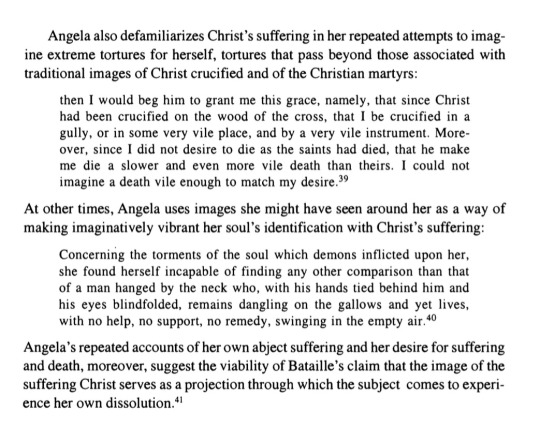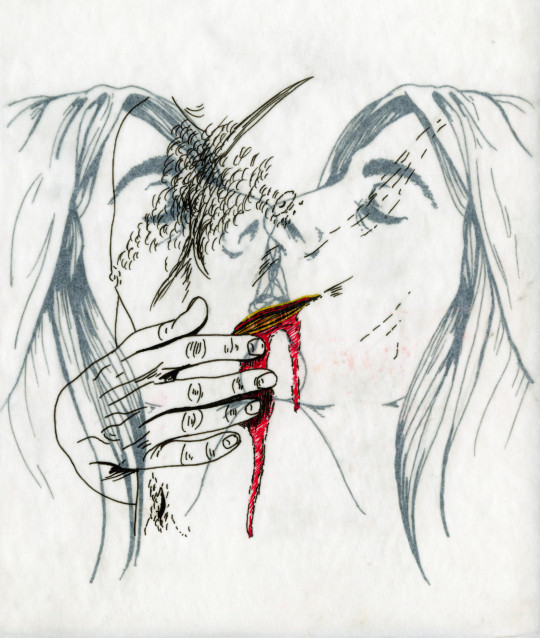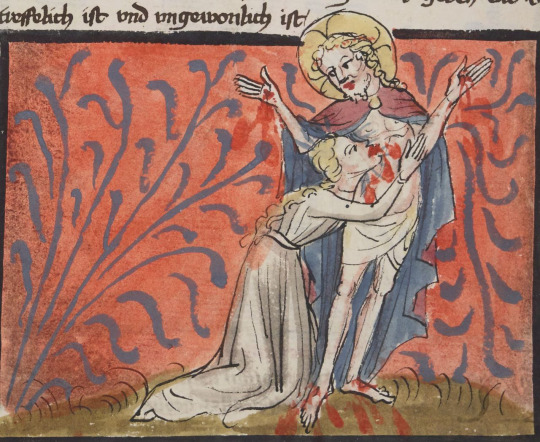#Angela of Foligno
Explore tagged Tumblr posts
Text

From Amy Hollywood’s "Beautiful as a Wasp": Angela of Foligno and Georges Bataille
*
Ecstatic darkness in the void. Angela of Foligno is the original badass.
#literature#mysticism#christian mysticism#Angela of Foligno#georges bataille#bataille#amy hollywood#masochism#negative theology#theology#christianity
62 notes
·
View notes
Text
learning about medieval mystic angela of foligno and her erotic visions, like approaching christ naked and drinking the blood and water from the spear wound in his side
5 notes
·
View notes
Text
Irrespective of whether or not they are living or dead or even if they are real people or fictional, my dream brunch guests would include the following:
Shalom Harlow
Pam Grier
Christopher Marlowe
Rita Repulsa
Toshiro Mifune (so I can shoot my shot and shamelessly flirt with him)
Angela of Foligno
Joan Crawford
Kenneth Grant
Jules Cheret
#brunch#people i want to meet#shalom harlow#fashion#pam grier#exploitation movies#1970s movies#christopher marlowe#dr. faust#shakespeare#rita repulsa#power rangers#boom! comics power rangers#toshiro mifune#my husband#akira kurosawa#angela of foligno#catholicism#christian mysticism#joan crawford#golden age of hollywood#kenneth grant#british occultism#occultism#jules chéret#belle epoque#poster art#vintage posters#lithography#gay
4 notes
·
View notes
Text

angela of foligno / pen on tracing paper
© jonah brock 2022
#angela of foligno#christian mysticism#art#artists on tumblr#pen drawing#christian art#spiritual art
11 notes
·
View notes
Text
why does no one talk about tom riddle’s mother, merope gaunt ? the woman who seduced the man she obsessively loved with advanced sorcery and liberated him a year into their marriage just for him to flee and leave her and their son. i think it’s quite strange how pivotal of a character she is and yet how little she is spoken about. she was a horrible person who surrendered to cunning and morbid methods to obtain what she wanted. i think she is even more relevant still because, what if the fact tom riddle was conceived under the illusion of love, the reason he seems to lack emotional compassion, and further yet, cultivate throughout his life a visceral hatred for the world? so was this deranged woman's madness what caused a few decades later the collapse of the magical society? how can the delusion of a one woman who only lived 19 years cause the near ending of an entire civilisation? she reminds me of madame Bovary who let herself be charmed by the illusion of luxury she didn’t have and preferred to end her life than to face the dichotomy that exists between what she wanted and her life.
she was insane, she was struck by divine madness, and she gave birth to chaos itself




#she was the og love witch#i kind of see her as a pure blood woman whose family intentionally ignored the symptoms of her insanity#allowing her to doom herself#she also reminds me of angela of foligno#when i discovered she died at nineteen i was sooo surprised#it’s so nice to post again after having all my time consumed by school#merope gaunt#tom riddle
29 notes
·
View notes
Text
Angela da Foligno, la santa mistica
Ciò che emerge dagli Scritti di sant’Angela da Foligno è qualcosa di incredibile: nello sfogliare queste sue parole, non si comprende davvero come sia stata possibile una simile trasformazione. Parole divine in un corpo e in un’anima che prima dell’incontro con Cristo, con Dio, erano ben salde sulla terra. Continue reading Angela da Foligno, la santa mistica
2 notes
·
View notes
Text
need someone to lick the pus and ichorous substance from my wounds
#who was the saint who did that again. i cant remember.#im pretty sure it was angela of foligno or did she just eat scabs#edit: i was thinking of catherine of siena#wild girl i love her sm
3 notes
·
View notes
Text
When God appears in the dark, there's no laughter or ardor or devotion or love, there's nothing on your face or in your heart, not a shudder, not a movement. The body sees nothing, the eyes of the soul open up. The body rests and sleeps, stays speechless and motionless. All the acts of friendship God has vouchsafed me, numerous and indescribable, and his sweetness and gifts and words and operations, all this is small when placed next to Him whom I see in the vastness of the dark.
Angela of Foligno
33 notes
·
View notes
Text





Margaret of Cortana in Holy Anorexia, Rudolph Bell / Yvette of Huy in Lives of the Anchoresses, Anneke Mulder-Bakker / Veronica Giuliani in Holy Anorexia, Rudolph Bell / Catherine of Siena in A Hagiography of St. Catherine of Siena / Angela of Foligno in Holy Anorexia, Rudolph Bell
Some of the most sexual parts of these hagiographies
98 notes
·
View notes
Text
Standing before the crucifix Angela strips herself of all her clothing and pledges to Christ, her newfound lover, perpetual chastity.
Angela de Foligno: Complete Works
22 notes
·
View notes
Text
Isn't it strange that the Lands Between are so fixated on death and birth, and yet there's very little at all to be found about living? Where's the festivals and flowers, so to speak? The pleasure, the vice, the hedonism so characteristic of the heights of Rome? I know there's Catholicism everywhere but they still came up with stuff like The Ecstasy of Saint Teresa, all of the iconography of Saint Sebastian, and whatever the hell is going on with St. Angela of Foligno. Where's the blood and wine, the theatre? The not-quite-sanctioned debauchery? I know Rykard was on that Erzabet Bathory life plan, and good on him, but you know he wasn't the only one.
The game is about death, of course, but death loses its importance and meaning without the equal and opposing force of an appealing life to fight for. The topic comes up a lot in the Deathbird related items, the branchswords and the sacrificial axe and such. It's something I've been thinking about.
15 notes
·
View notes
Text
some notes on sufism

The other day I went to the Harvard Divinity School Muslims iftar (the meal that breaks the fast during Ramadan), which was followed by a concert of Turkish music that is traditionally performed in Sufi lodges in Istambul. Before the music began, the professor I’ve been auditing Islamic literature classes with read some verses from Rumi’s Masnavi and offered a meditation on fasting through an interpretation of the lines: “If you have closed this mouth, another mouth is opened, which becomes an eater of the morsels of mysteries.” That is the nature of mystical knowledge—gnosis (or maʿrifa) is not understood intellectually, but tasted (dhawq). The closing of the bodily mouth is an opening of the spiritual mouth. He asked us to listen to the music with the inner heart.
I went with my friend S, who has been nudging me toward conversion. I’ve been allergic to religion most of my life because I’m not really much of a joiner. I distinctly remember being in (Catholic) Sunday School as a child and thinking to myself: This sounds fake to me. As in, made-up, irrational. The people who treated the fanciful stories like fact seemed like crackpots to me, even to my child-mind. I don’t think I ever believed in Santa either—I guess my disposition was innately skeptical; perhaps that contributed to my identification with anarchism from when I was 13 or 14. Yet at the same time, my feeling for the invisible, for the world of the dead, was always quite strong, even when it was unstitched from a belief system. As a kid I would wander the house alone at night, thinking I could hear my dead parakeet chirping from a shoebox in the garage.
I hated Sunday School. While I was always good at school-school (at least when I was a child, before I became an incorrigible truant), I was terrible at Sunday School. Because it seemed like hocus-pocus to me, none of it stuck. My classmates had internalized all the stories I thought were outlandish. During mass I would think exclusively about donuts, the ones we would buy from the ladies who would sell them as a fundraiser. I’ve thought about returning to Catholicism, but sadly, after the post-1970s political realignment in the US, all the leftist Catholics (the Marxists who loathed the Vietnam War and exposed the FBI’s COINTELPRO) are gone. As much as I love reading Catholic mystics (St Teresa of Avila, St John of the Cross, Angela of Foligno, Hildegard of Bingen, Meister Eckhart, Marguerite Porete, and others), Christian mysticism is more individualist than Islamic mysticism—asceticism and separation from the group is the way to commune with God, while Islamic mysticism is rooted in communal practices like sama (singing, dancing, reciting poetry, playing/listening to music) and dhikr (communal prayer for the remembrance of God). While Christian mysticism bears the imprint of the Neoplatonist trajectory of ascent, for Sufism, the trajectory is shaped like a paisley. After fana (annihilation of the ego/union with God/dying before you die), there is baqaa or subsistence, a return of sorts.
I also much prefer the Islamic orientation to the created world than the Christian one, for in Islam, everything in creation can be understood as the breath or speech of God. The Hadith on which Sufi cosmology is based reads, “I was a hidden Treasure and Loved to be known, so I created the world that I might be known.” All of creation is a mirror to reflect God (this is why you must polish the rust from your heart, for the human heart can manifest all the names and qualities of God). In the Islamic mystical tradition there is an affirmation of the created world even though God and creation are not the same (as is the case in Pantheism). Everything has ontology. Nothing has ontology. The Sufi metaphysicians ask us to see with two eyes. The drop is not the ocean at the same time it cannot be separated from the ocean.
7 years ago I read Reza Aslan’s God: A Human History. After sampling the platter of world religions I joked to myself, Hmmm, if I had to pick the one I vibe with most, I guess it would be Sufism (Islamic mysticism). I didn’t know anything about Sufism other than the Rumi and Hafez poetry I read as a teenager, but the way Aslan described Ibn ‘Arabi’s concept of 'wahadat al-wujud' (or Unity of Being) reminded me of Spinozism. I guess what I’m trying to say is...I just think Sufi metaphysics is...right. Or, it speaks to how I tend to think about reality. It’s not something I can prove (that I don’t exist, while at the same time I am part of the ALL that is God), but it makes the most sense to me.
In the Sufi literature class, S jokes to me: “You’re the only non-Muslim in this class.” The same was probably true at the iftar + concert. S points to someone from the class: “The Maoist is a recent convert. This is their first time fasting for Ramadan.” ���Is [our professor] fasting?” “Of course. I saw him at the iftar last night and talked to him about translation. I told him it’s ghastly to try to fit Persian verse into an English rhyme scheme. He agreed with me.” (We are clearly partisans of blank verse translations… yet so much of what’s out there has been poorly translated or not translated at all.)
Much of the lyrics sung with the gorgeous music were verses written by the great Turkish-language Sufi poet and mystic Yunus Emre ("the Dante of Turkey," I whispered to S). S was ecstatic listening to the haunting ney (a kind of flute). We just so happened to be sitting in the same row as the professor. I tapped S and whispered that it looked like he was really enjoying the music. He was smiling with his eyes closed and swaying his head from side to side. He looked like he was having...a profound experience. This prof usually has what I guess you’d call ‘resting bitch face’ (which I always found funny because it runs counter to his sweet and gentle personality). But not at the concert. Pure bliss was painted on his face. It was then that it dawned on me that Sufism, for him, was probably something more than a scholarly interest. I thought about what it must have been like to discover something so beautiful and profound, and to know, in that moment, that your life will be changed forever—you might go off to Iran and devote your entire life to studying medieval texts.
Of course this Ramadan I am thinking continuously about the genocide in Gaza, how an entire population is being starved to death by the sadistic leaders of Israel, how terrible it must be to be bombed and shot at during the holy month, or to break your fast with boiled grass and animal feed. I feel truly ashamed to come from a country that is complicit in this violence. I hope everyone continues to apply pressure to end this war—it feels hopeless now, but it is making a difference.
26 notes
·
View notes
Text

who's doing it like angela of foligno that's right nobody
40 notes
·
View notes
Text
youtube
who up following Angela of Foligno's thirty spiritual stages to experience a purgative, penitential, self-reflective "game of love" that ultimately unites one with a darkness so profound and absolute that it becomes divine
3 notes
·
View notes